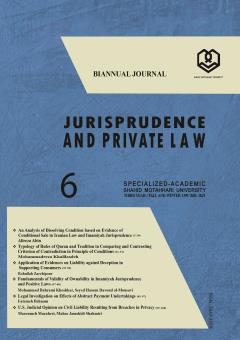-
-
-
Open Access Article
1 - Delivery of Goods for Future Transaction and Its Guarantee Based on Imamiyah Jurisprudence and Positive Laws (ius positum)
Seyed Mohammad Sadeq Mousavi Maryam PourtolueiWhen a commodity is submitted by the owner to the other party for future transaction, the mutual relations can be in the form of contract, unilateral obligation or mere authorization. Therefore, the nature of this relationship depends on the intention of the parties and MoreWhen a commodity is submitted by the owner to the other party for future transaction, the mutual relations can be in the form of contract, unilateral obligation or mere authorization. Therefore, the nature of this relationship depends on the intention of the parties and there is no obstacle according to Sharia law to it. The practice has some effects and it is necessary to identify these effects in order to determine the type of relationship of the transactors and arbitration between them. Guarantee on damage or loss of the commodity is one of the guarantees that in view of some jurists is the owner’s obligation, while some consider it that of the receiver. However, since the owner delivers the commodity to the other party upon his will, it is unlikely to consider the receiver responsible unless in wasting commodity or in encroachment. Therefore, guaranteeing the commodity in case of damage or loss is on the owner. Upon evaluation of various views on the nature and impact of the said institution, in this paper all aforesaid views can be taken as one. In this case, the probable problems for the traders in this area will be removed and the ground will be prepared for a fair arbitration between them. Manuscript profile -
Open Access Article
2 - The Nature and Conditions for Transfer of Professional Soccer Players
Seyed Hamid Reza MousavipourAbstract: The transfer contract of professional soccer player is the most important contract in this sport. According to this contract, the player is committed to play for a certain club within a certain period of time for a specified sum of money. Conclusion and termin MoreAbstract: The transfer contract of professional soccer player is the most important contract in this sport. According to this contract, the player is committed to play for a certain club within a certain period of time for a specified sum of money. Conclusion and termination of this contract are subject to special international and domestic rules and regulations that are quite distinctive from other contracts. Like a person’s hiring contract, this contract is a binding obligation that will be enforceable after signing of the two parties. The contract parties are the professional player and the sports club that must possess capacity to sign a contract. This contract is of binding obligation, thus it shall be only null and void with the consent of the parties or upon a justifiable excuse. Meanwhile, the contract parties should act based on bona fide. In this research work, we will first review the nature of contracts in Iranian law and then proceed with studying conditions for validity of the contract according to the international and domestic rules and regulations. Manuscript profile -
Open Access Article
3 - Theory of Extinction of Original Obligations by Signing Commercial Papers
Alireza Alipanah Somayeh Ahmadi Majdabadi FarahaniThe issuance and delivery of commercial papers do not mean fulfilment of payments or extinction of previous obligations; rather, it is with the hand-over of the commercial papers that both obligations under the commercial papers are met and the original obligations beco MoreThe issuance and delivery of commercial papers do not mean fulfilment of payments or extinction of previous obligations; rather, it is with the hand-over of the commercial papers that both obligations under the commercial papers are met and the original obligations become extinct. Although commercial papers bear obligation per se, until before payments for commercial papers are made, the criterion for action will be original obligations. There is, of course, difference of opinion among jurists on this rule, while it has been confirmed in the majority of the legal systems. However, there is another theory stipulating that issuing a commercial paper and handing it over to the creditor suffices for extinction of original obligations. The proponents of this theory believe in the “substitution of commercial papers”. Although they accept the fact that a commercial paper means ‘commitment to pay’ not ‘payment per se’, they believe that the obligation coming from the commercial paper shall be replaced with the original obligation, suggesting that somehow a shift of obligation takes place. Manuscript profile -
Open Access Article
4 - Fundamentals of “Principle of Unconditionality of Commercial Paper Obligations” in Iran’s Jurisprudence and Law
Akram Safiri Farzaneh KarimiThe role commercial papers play in transactions and economic relations is this that they are appropriate substitutes for cash in payments. Along with easy, fast and safe transfer and turn-over, they guarantee the rights of the owner as well. Realization of this will be MoreThe role commercial papers play in transactions and economic relations is this that they are appropriate substitutes for cash in payments. Along with easy, fast and safe transfer and turn-over, they guarantee the rights of the owner as well. Realization of this will be possible when obligations of the signatories of the papers are expressed absolutely and clearly, not conditioned to anything else. The prerequisites calling for unconditionality of commercial papers are considered among the fundamentals of this principle, which we have studied in this paper in two sections of “legal requirements” (the need for using commercial papers instead of cash, the need for meeting speed, ease and security in carrying and transfer of commercial papers and the need for protecting the rights of the commercial paper owners) and “jurisprudential requirements” (exigency of protecting property and preventing disruption in economic system). Manuscript profile
List of Articles obligation
-
The rights to this website are owned by the Raimag Press Management System.
Copyright © 2017-2024


